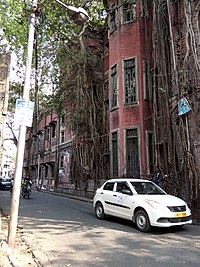| Raja Subodh Chandra Basu Mallik | |
|---|---|
 | |
| Born | Subodh Chandra Basu Mallik (1879-02-09)9 February 1879 Calcutta, India |
| Died | 14 November 1920(1920-11-14) (aged 41) Calcutta, India |
| Other names | Raja Subodh Mallik |
| Occupation | Indian Nationalist |
| Organization | Jugantar |
| Known for | Indian independence movement |
| Notable work | National Council for Education |
Subodh Chandra Basu Mallik (9 February 1879 – 14 November 1920), commonly known as Raja Subodh Mallik, was a Bengali Indian industrialist, philanthropist and nationalist. Mallik is noted as a nationalist intellectual who was one of the co-founders of the Bengal National College, of which he was the principal financial supporter. He was close to Aurobindo Ghosh and financed the latter's nationalist publications including Bande Mataram.
Life and works

Mallik was born in Pataldanga suburb of Calcutta to Prabodh Chandra Basu Mallik. He graduated from St. Xaviers College Calcutta and Presidency College Calcutta before enrolling at Trinity College, Cambridge in 1900.

He returned from England before completing his university studies, and immediately delved into the nationalist movement. His palatial house in what was then Wellington square in Calcutta became a major hub of political activity. In 1906, Mallik was among a group of leading luminaries of Bengal who founded the National Council for Education to promote indigenous and nationalist education in higher education. He donated Rs 100,000 to support the new Bengal National College. He also founded the Life of Asia Insurance Company. Mallik's political activities earned him the ire of the Raj, and he was deported in 1908 in the wake of the Alipore Bomb Conspiracy. Mallik's nationalist work and generous support of the movement earned him the colloquial title of Raja from his grateful countrymen.

In independent India, Wellington Square, the site of his palatial residence, was renamed Raja Subodh Mallik Square, while the road housing Jadavpur University, which emerged from the Bengal National College, is now called Raja Subodh Chandra Mallik Road.
References
- Chakrabarti & Chakrabarti 2013, p. 292
- ^ De, Amalendu (1996). Raja Subodh Chandra Mallik and His Times. Calcutta: National Council of Education, Bengal. p. 51. OCLC 37696489.
- De, Amalendu (1996). Raja Subodh Chandra Mallik and His Times. Calcutta: National Council of Education, Bengal. p. 70. OCLC 37696489.
- De, Amalendu (1996). Raja Subodh Chandra Mallik and His Times. Calcutta: National Council of Education, Bengal. p. 82. OCLC 37696489.
- De, Amalendu (1996). Raja Subodh Chandra Mallik and His Times. Calcutta: National Council of Education, Bengal. p. 177. OCLC 37696489.
- De, Amalendu (1996). Raja Subodh Chandra Mallik and His Times. Calcutta: National Council of Education, Bengal. p. 158. OCLC 37696489.
- Chakrabarti, Kunal; Chakrabarti, Shubhra (2013), Historical Dictionary of the Bengalis, Rowman & Littlefield, ISBN 978-0810853348
External links
- Subodh Chandra Mullick at Site of Sri Aurobindo and The Mother (2016 archived copy)
- Residence & Hub of Nationalists at Lakshmi's House - Sri Aurobindo Institute
- 1879 births
- 1920 deaths
- 19th-century Indian educators
- 19th-century Indian politicians
- 20th-century Indian educators
- 20th-century Indian politicians
- Alumni of Trinity College, Cambridge
- Anushilan Samiti
- Bengali Hindus
- 20th-century Bengalis
- 19th-century Bengalis
- Indian independence activists from Bengal
- Indian National Congress politicians from West Bengal
- Indian sociologists
- Politicians from Kolkata
- Prisoners and detainees of British India
- Revolutionary movement for Indian independence
- University of Calcutta alumni
- Indian educators
- Indian philanthropists
- Educators from West Bengal
